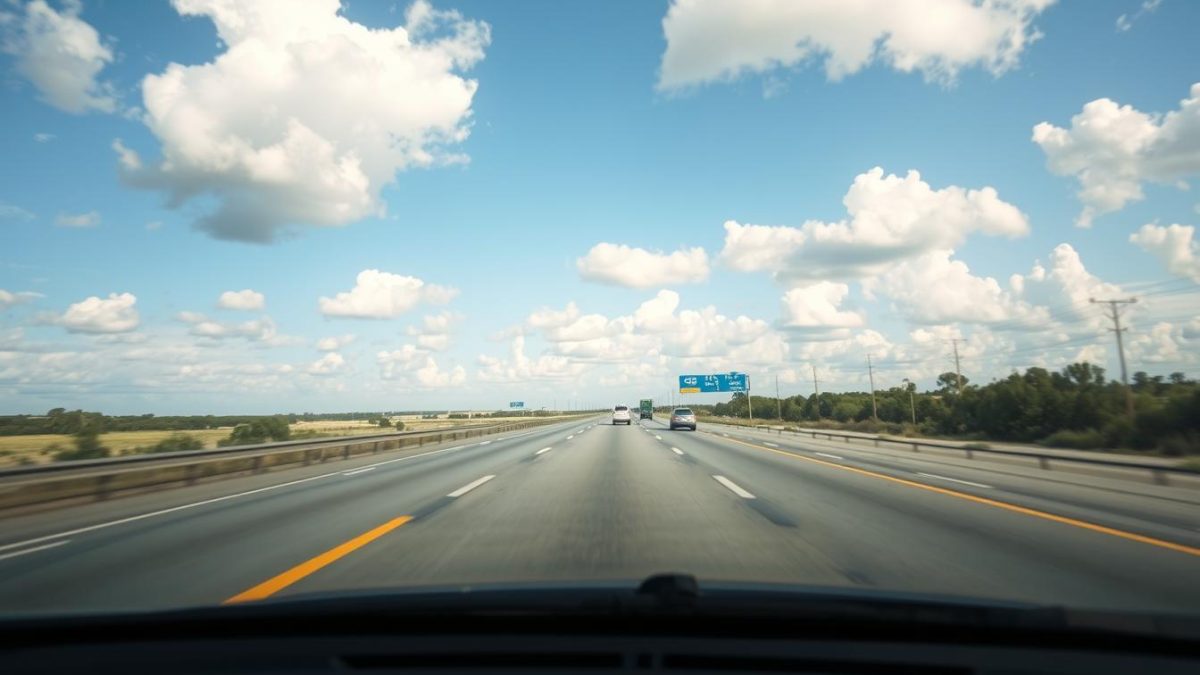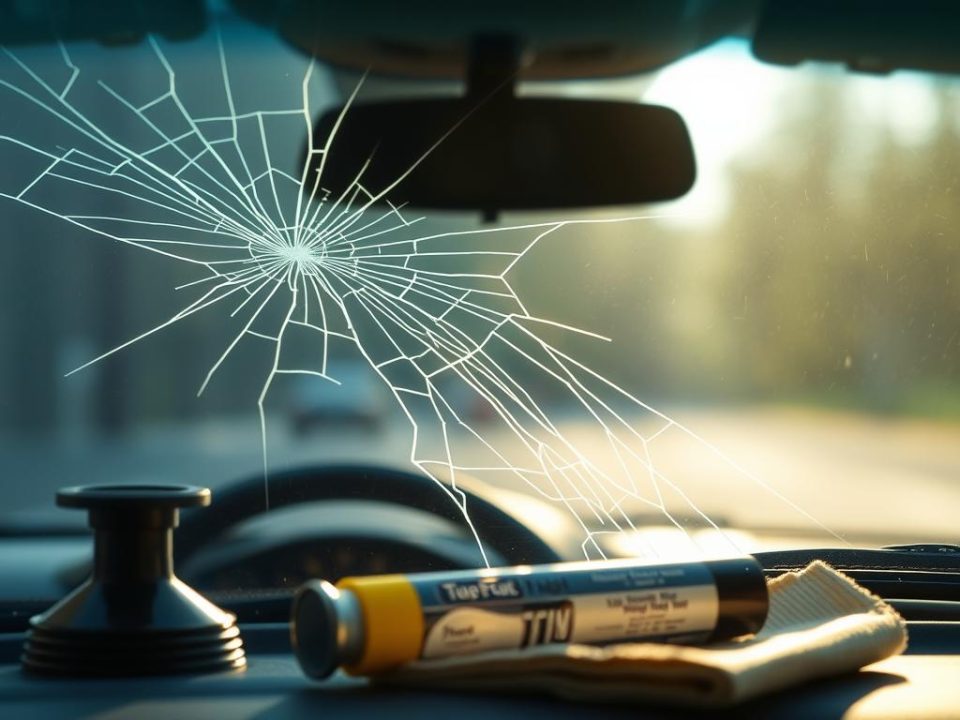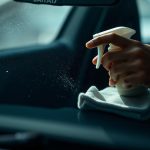
How Often Should You Inspect and Maintain Your Auto Glass?

What a Lifetime Windshield Warranty Really Means for San Antonio Drivers
Driving with a damaged windshield can be a significant concern for many Texas drivers. While federal laws permit small chips or cracks in a windshield, individual states like Texas have their own regulations regarding windshield laws and safety standards.
The laws governing windshield damage are crucial for drivers to understand, as they directly impact road safety and the potential for legal issues. In Texas, the legality of driving with a damaged windshield depends on factors such as the size and location of the damage, as well as its effect on the driver’s visibility. Companies like Miracle Auto Glass provide expert repair services to help drivers maintain compliance with state regulations.
Key Takeaways
- Texas has specific windshield laws that differ from federal guidelines.
- The size and location of windshield damage affect its legality.
- Understanding these laws helps drivers avoid tickets and ensures road safety.
- Miracle Auto Glass offers expert windshield repair services.
- Drivers must be aware of how windshield damage impacts their visibility.
Understanding Cracked Windshield Legality in Texas
The legality of cracked windshields in Texas is a complex issue that drivers must be aware of. Texas follows federal windshield regulations as a baseline but has also implemented state-specific laws that drivers must understand to remain compliant.
Texas-Specific Windshield Laws
Under the Texas transportation code, windshields must be free from defects that substantially obstruct the driver’s view of the road. Texas law enforcement officers have discretion in determining whether a cracked windshield creates a safety hazard or obstructs the driver’s clear view. Additionally, Texas vehicle inspection requirements include windshield condition assessment, making windshield integrity an important factor for passing annual inspections. The critical vision area above the steering wheel must remain largely unobstructed.
Federal Windshield Regulations
Federal regulations, as outlined by the U.S. Department of Transportation, provide minimum standards for windshield integrity. These regulations prohibit cracks larger than 3/4 inch in diameter, multiple cracks within three inches of each other, and any damage directly in the driver’s line of sight. Understanding these federal regulations, along with Texas state laws, helps drivers determine when windshield repair becomes a legal necessity rather than just a cosmetic concern.
By being aware of both Texas and federal regulations, drivers can ensure they are driving legally and safely. For professional windshield repair services, drivers can rely on experts like Miracle Auto Glass to handle their windshield needs.
Types of Windshield Damage and Their Legal Status
Understanding the various types of windshield damage is crucial for determining their legality and safety on Texas roads. Windshield damage can result from various factors, including hail, flying road debris, and fluctuating temperatures, leading to a range of issues from minor distractions to significant vision impairments.
Small Chips and Cracks
Small chips under 3/4 inch in diameter are generally considered legal in Texas unless they are in the driver’s direct line of sight or critical viewing area. Miracle Auto Glass technicians can assess such damage to determine if a repair is legally required.
Star Breaks and Bull’s-Eyes
Star breaks and bull’s-eye cracks, caused by direct impacts, can quickly spread and potentially become illegal if they exceed size limitations or obstruct vision. The location of such damage significantly affects its legality.
Long Cracks and Multiple Damage Points
Long cracks exceeding 11 inches may be considered illegal, especially if they cross into the driver’s primary field of vision. Multiple damage points within 3 inches of each other are also concerning from both legal and structural perspectives. 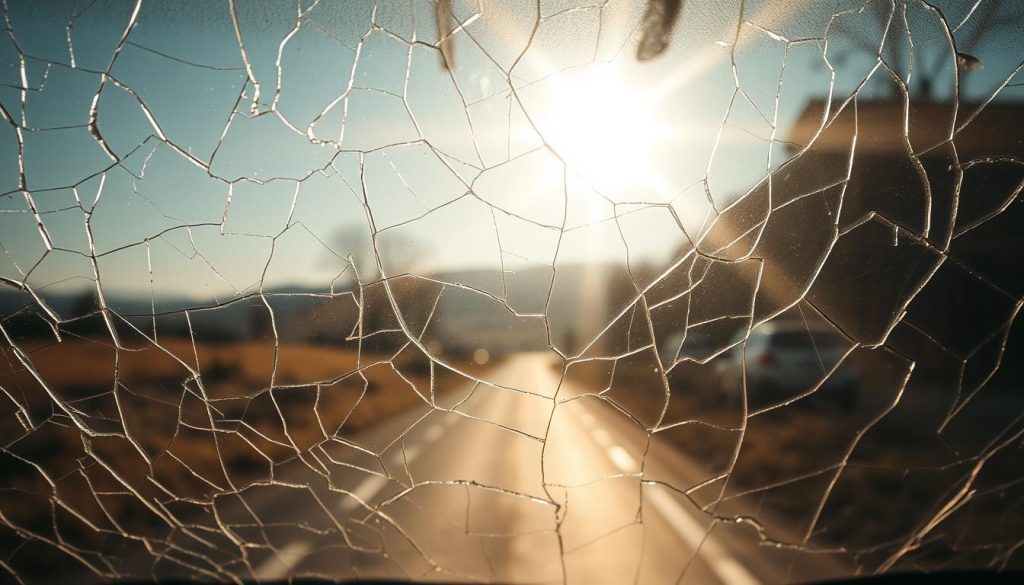
Safety Concerns of Driving with a Damaged Windshield
Beyond the legal aspects, driving with a cracked windshield presents numerous safety hazards. A damaged windshield can compromise the overall safety of the vehicle, putting the driver and passengers at risk.
Visibility Impairment
Visibility impairment is a significant concern when driving with a damaged windshield. Cracks can refract light, creating glare, or produce blind spots, especially during bright sunny days or nighttime driving. The critical vision area directly above the steering wheel, extending one inch from each side and two inches from the top, requires special attention as any obstruction here significantly increases accident risk.
Structural Integrity Risks
The windshield contributes up to 30% of a vehicle’s structural integrity, playing a crucial role in roof support during rollover accidents common on Texas highways. Modern vehicles rely on windshields for proper airbag deployment—a compromised windshield may affect this critical safety feature.
Potential for Further Damage
Temperature fluctuations common in the Texas climate can cause existing cracks to expand rapidly, potentially creating sudden visibility issues while driving. Miracle Auto Glass prioritizes safety by addressing both the immediate damage and potential future risks when performing repairs.
Legal Consequences of Driving with a Cracked Windshield
The legal implications of driving with a cracked windshield in Texas are multifaceted. Drivers need to be aware of the potential legal consequences beyond the immediate safety risks.
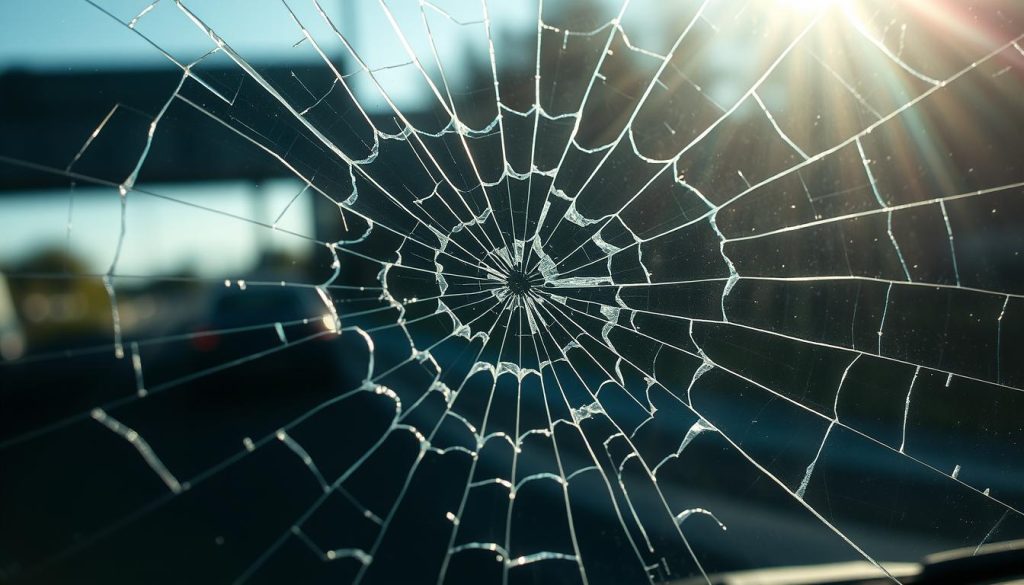
Potential Fines and Tickets in Texas
In Texas, law enforcement officers have the authority to issue citations for equipment violations if a windshield crack impairs driver visibility or creates a safety hazard. Fines typically range from $100 to $200, though costs can escalate with additional court fees or for repeat offenders.
Drivers may be able to avoid these fines by providing proof of windshield repair or replacement within a specified timeframe, thus mitigating the legal consequences.
Liability in Case of Accidents
In the event of an accident, a pre-existing cracked windshield could be considered negligence, potentially increasing a driver’s liability and affecting insurance claims. This underlines the importance of addressing windshield damage promptly.
Miracle Auto Glass helps Texas drivers avoid these legal issues through prompt, professional windshield repair services, ensuring both safety and legal compliance.
Windshield Repair and Replacement Options in Texas
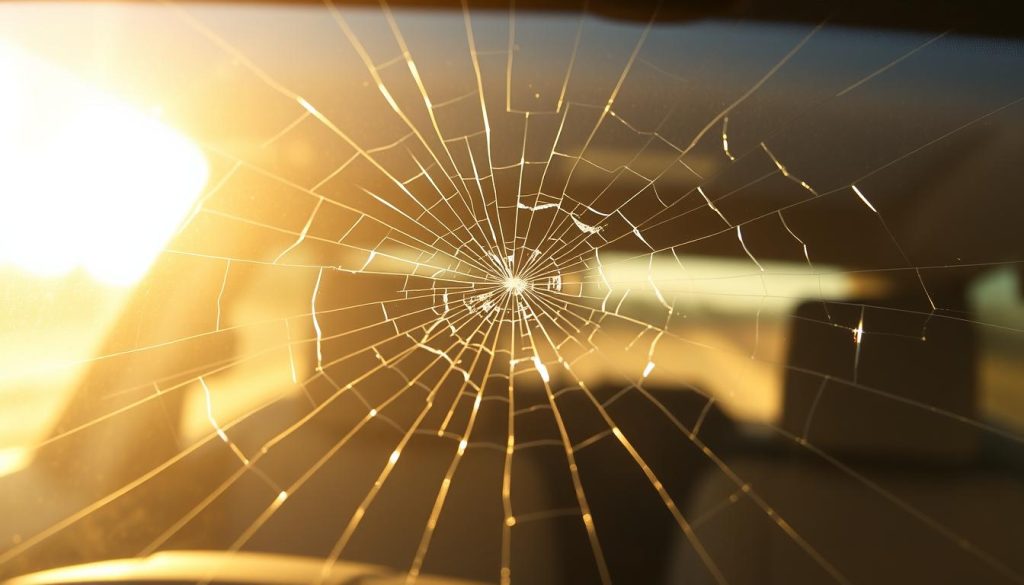
Repairing or replacing a cracked windshield in Texas is a decision that depends on several factors, including the severity, location, and age of the damage.
Texas drivers have several options for addressing windshield damage. The decision to repair or replace depends on the extent of the damage.
When to Repair vs. Replace
Small chips and cracks under 3 inches can typically be repaired, while larger or more complex damage patterns generally require full windshield replacement. The location and age of the damage also play a crucial role in this decision.
Professional Repair Services
Professional repair services like Miracle Auto Glass offer specialized techniques that restore both the appearance and structural integrity of damaged windshields. Their certified technicians are trained in the latest repair methods, ensuring quality results.
Miracle Auto Glass Repair Process
The Miracle Auto Glass repair process involves a thorough assessment, advanced resin injection, curing, and finishing to ensure optimal results. Most repairs can be completed in under an hour, making it a time-efficient solution for Texas drivers.
By choosing a professional service, drivers can ensure that their windshield is repaired or replaced correctly, maintaining both safety and compliance with Texas laws.
Insurance Coverage for Windshield Damage in Texas
In Texas, knowing your insurance coverage for windshield damage can save you from unexpected repair costs. Comprehensive auto insurance policies typically cover windshield repair or replacement.
Comprehensive Coverage Policies
Comprehensive auto coverage usually includes windshield glass repairs and replacements. Adding this coverage to your auto insurance policy allows you to have a cracked windshield repaired quickly at lower or no cost. It’s essential to review your policy details as coverage varies between insurers and policy types.
- Many Texas insurance providers offer specific glass coverage options that may provide deductible waivers for windshield repairs.
- Miracle Auto Glass works directly with all major insurance providers to streamline the claims process for customers.
Filing a Windshield Damage Claim
Filing a windshield damage claim in Texas generally doesn’t impact insurance premiums as it’s considered a no-fault comprehensive claim. The claims process typically involves contacting your insurance provider, scheduling an assessment, and arranging repair with an approved service provider like Miracle Auto Glass.
Conclusion: Maintaining a Legal and Safe Windshield
Maintaining a safe and legal windshield is crucial for drivers in Texas. To ensure compliance with Texas laws and guarantee driver and passenger safety, regular windshield inspections are essential. This proactive approach helps identify minor damage before it develops into more serious cracks that violate Texas regulations.
Addressing chips and small cracks promptly can prevent them from expanding into larger problems. Texas drivers should be particularly vigilant during extreme weather conditions when temperature fluctuations can cause existing damage to worsen rapidly. By understanding the specific legal requirements for windshield condition, drivers can make informed decisions about repair timing and necessity.
With comprehensive coverage, you can get back on the road with a fixed windshield and avoid breaking the cracked windshield laws in your state. Miracle Auto Glass provides expert consultation to help determine whether your windshield damage requires immediate attention for legal compliance. Don’t wait until a small crack becomes a major problem—contact Miracle Auto Glass today for a free assessment of your windshield condition.

